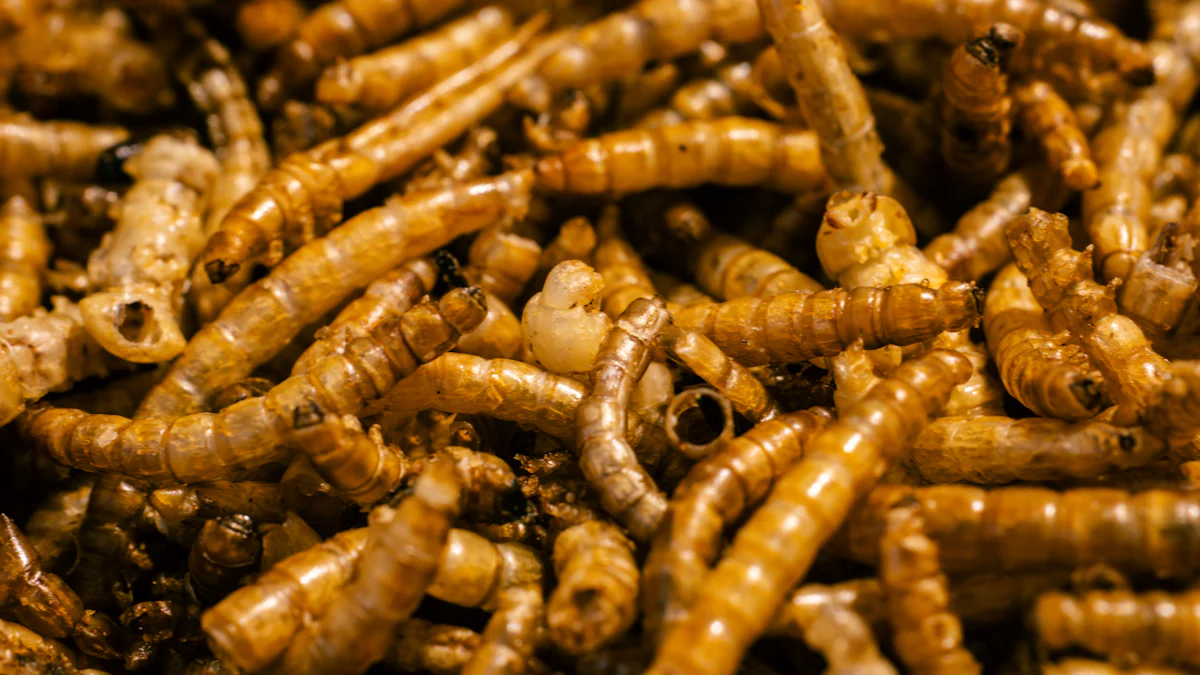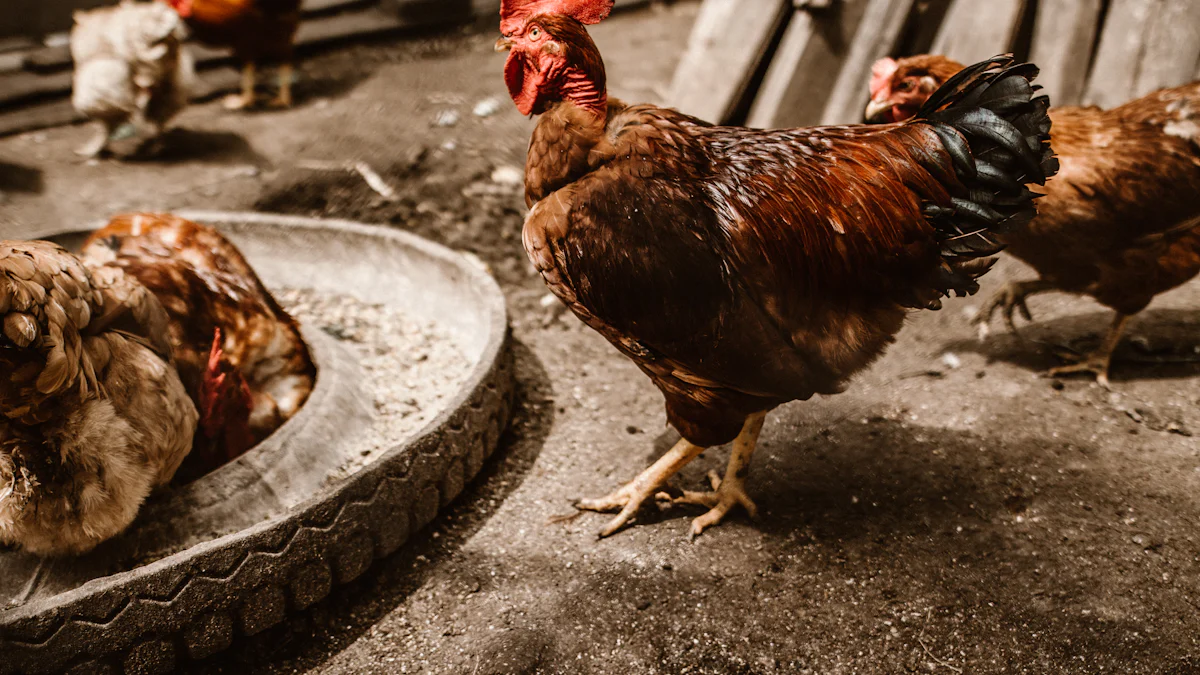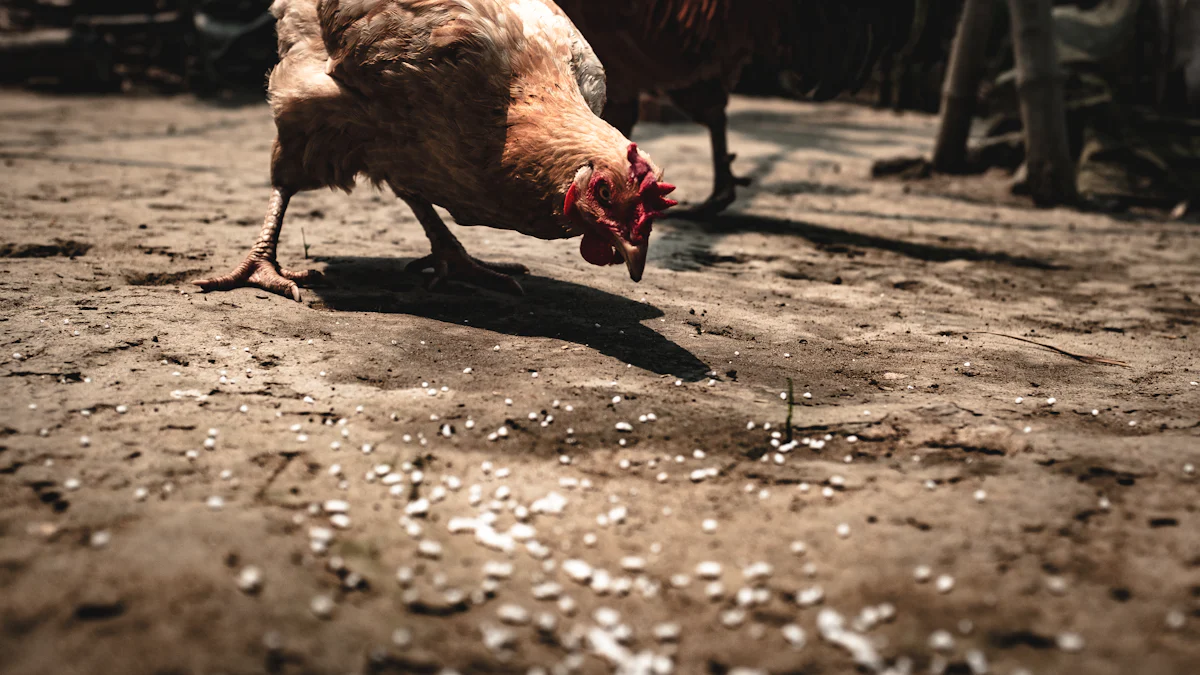
Mealworms are a powerhouse of nutrition for chickens. They pack a punch with 50-60% crude protein, which supports growth and feather health. Their fats provide energy, while fiber aids digestion. Essential vitamins like B12 and minerals such as phosphorus boost vitality. In 2025, mealworms for chickens stand out as a sustainable, eco-friendly feed option. They produce fewer greenhouse gases than traditional livestock and meet the demand for alternative protein sources. This makes them a smart choice for chicken keepers looking to improve flock health while caring for the planet.
Key Takeaways
- Mealworms give chickens protein, vitamins, and minerals for growth.
- They help with feather strength and improve the quality of eggs.
- Eating mealworms makes chickens forage, stay active, and feel less stressed.
- This keeps chickens healthy and happy overall.
- Mealworms are eco-friendly, needing less land and water to grow.
- They are a sustainable and smart choice for chicken owners.
Nutritional Benefits of Mealworms for Chickens

High Protein Content for Growth and Molting
Protein is vital for chickens, especially during growth and molting. Mealworms are an excellent source, containing up to 50% protein by weight. This makes them far superior to common feeds like corn, which has much lower protein levels. Chickens need extra protein during molting to regrow feathers and maintain their energy. Mealworms also provide essential amino acids like leucine and lysine. These amino acids help with tissue repair and calcium absorption, which are crucial for feather regeneration and overall health. Adding mealworms to a chicken’s diet ensures they get the protein boost they need to thrive.
Essential Nutrients for Feather Development and Vitality
Feathers are more than just a chicken’s outer layer—they’re a sign of health. Mealworms are packed with nutrients that support feather development. They contain amino acids like methionine and lysine, which strengthen feather structure. Vitamins such as riboflavin and niacin promote metabolism and growth, while minerals like calcium and phosphorus improve bone health. These nutrients work together to keep chickens vibrant and healthy. Feeding mealworms for chickens ensures they have the vitality to stay active and strong.
Enhancing Egg Quality and Shell Strength
Mealworms do wonders for egg production. Hens that consume mealworms lay eggs with thicker shells and richer yolks. The high protein content and omega-3 fatty acids in mealworms improve the nutritional profile of eggs, making them healthier for humans. Additionally, the calcium and phosphorus in mealworms contribute to stronger eggshells, reducing breakage. For chicken keepers, this means better-quality eggs that are more marketable and nutritious.
Feeding Mealworms to Chickens
Live vs. Dried Mealworms: Pros and Cons
Chicken keepers often wonder whether live or dried mealworms are better for their flock. Both options have unique benefits and drawbacks. Live mealworms provide a fun challenge for chickens, encouraging natural foraging behavior. They’re nutrient-rich and keep chickens entertained. However, live mealworms require proper storage and handling, which can be tricky. They’re also more expensive than dried options.
Dried mealworms, on the other hand, are convenient and easy to store. They’re cost-effective and retain most of their nutrients when preserved correctly. However, they don’t offer the same enrichment as live mealworms. Choosing between the two depends on your priorities—whether it’s convenience or encouraging natural behaviors in your chickens.
Serving Sizes and Feeding Frequency
Mealworms should be a treat, not the main course. Experts recommend feeding them two to three times a week. A small handful per session, about 5-10% of the chicken’s daily feed, is enough. For beginners, starting with a tablespoon and gradually increasing the amount works well. Overfeeding can lead to obesity and digestive issues, so moderation is key. Chickens thrive on variety, so mealworms should complement their regular feed, not replace it.
Incorporating Mealworms into a Balanced Diet
Mealworms are a fantastic addition to a chicken’s diet. They’re packed with protein, essential amino acids, and omega-3 fatty acids, which support growth, feather health, and egg production. To incorporate them, sprinkle mealworms over regular feed or offer them separately as a treat. Pair them with a balanced diet that includes chicken feed, fruits, vegetables, and grit for digestion. This ensures chickens get all the nutrients they need to stay healthy and productive.
Sustainability and Future of Mealworms for Chickens

Eco-Friendly and Cost-Effective Farming Practices
Mealworms are a game-changer for sustainable farming. Compared to traditional protein sources like livestock, mealworms require far less water, land, and feed. This reduces the strain on natural resources and lowers the carbon footprint of chicken farming. For example, mealworm production uses 70% less agricultural land and emits 23% fewer greenhouse gases than broiler farming. They can even thrive on organic waste, which helps reduce food waste while creating a valuable protein source.
From a cost perspective, mealworms are highly efficient. They need less feed to produce the same amount of edible protein as traditional livestock. A comparison shows that mealworms require only 3.61 kg of feed, while broilers need 4.91 kg. This efficiency makes mealworms a cost-effective option for chicken keepers looking to save money while supporting the environment.
Supporting Natural Foraging Behavior
Chickens love to forage—it’s in their nature. Mealworms encourage this instinct by providing a fun and nutritious snack. Foraging keeps chickens active and reduces stress, which improves their overall health. It also promotes mental stimulation, keeping chickens engaged and happy. By feeding mealworms, chicken keepers can support their flock’s physical and mental well-being while fostering natural behaviors.
Innovations in Mealworm Farming for 2025
The future of mealworm farming looks bright, thanks to exciting innovations. Vertical farming systems are becoming popular, allowing farmers to grow mealworms in smaller spaces while maximizing production. Automation and AI are also transforming the industry, making large-scale mealworm farming more efficient. Enhanced breeding programs are improving growth rates and nutritional content, ensuring mealworms remain a top-tier feed option. These advancements make mealworms for chickens an even more sustainable and practical choice in 2025.
Mealworms for chickens offer a winning combination of nutrition, sustainability, and enrichment. Packed with protein, vitamins, and minerals, they support growth, egg quality, and overall health. Their eco-friendly production reduces waste and promotes greener farming. As technology advances, mealworms are set to revolutionize poultry diets, making them a staple for chicken keepers in 2025 and beyond.
FAQ
What makes mealworms a good choice for chickens?
Mealworms are rich in protein, fats, and fiber. They also provide essential vitamins and minerals, supporting growth, egg production, and overall chicken health.
Are mealworms safe for chickens to eat?
Yes, mealworms meet FDA standards and come with a Veterinary Health Certificate. They’re safe, nutritious, and a reliable feed option for chickens.
Where can I buy high-quality mealworms?
You can find affordable, high-quality dried mealworms in various package sizes online. They’re easy to order, and customer support is available for any questions or advice.


